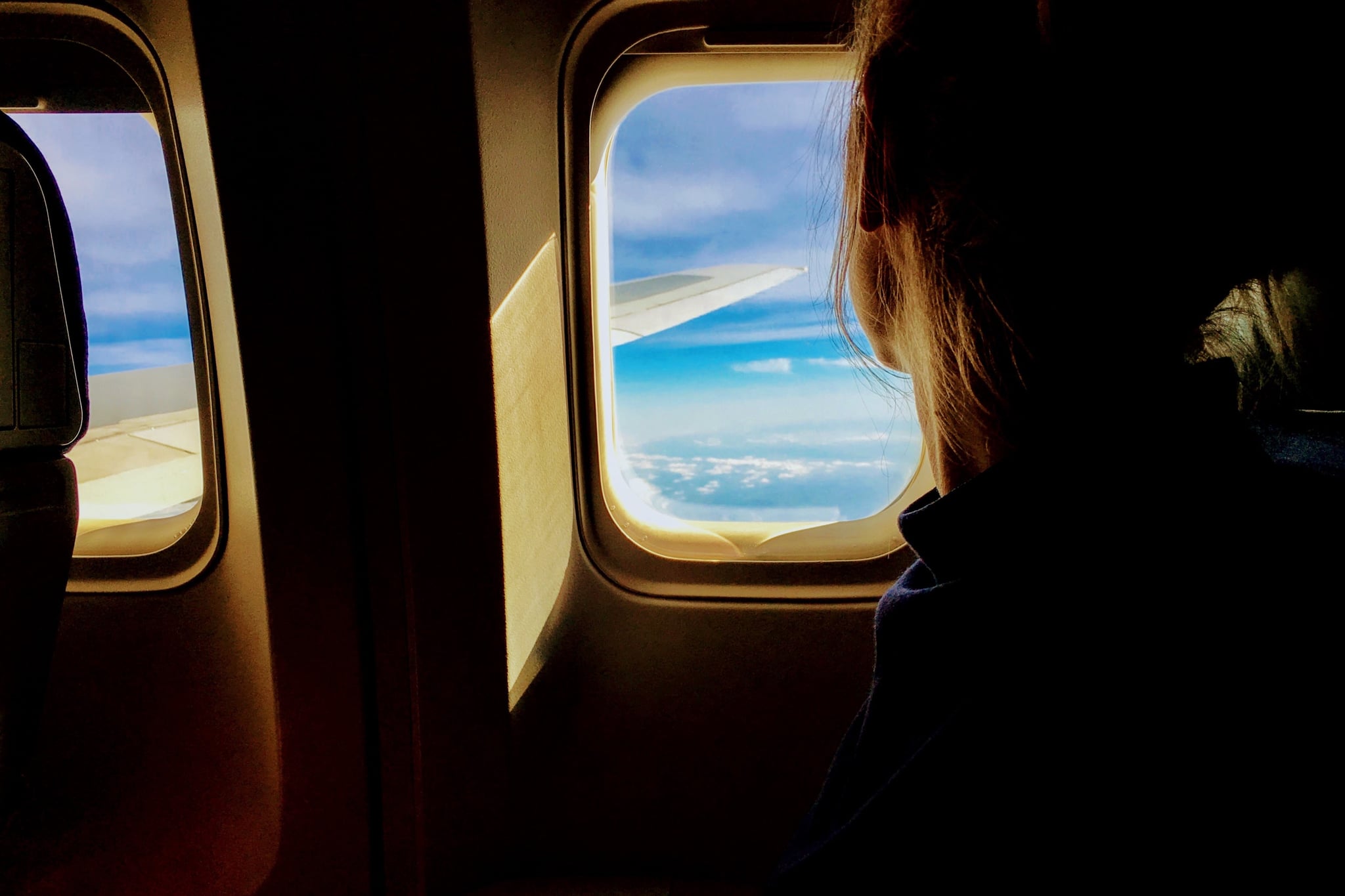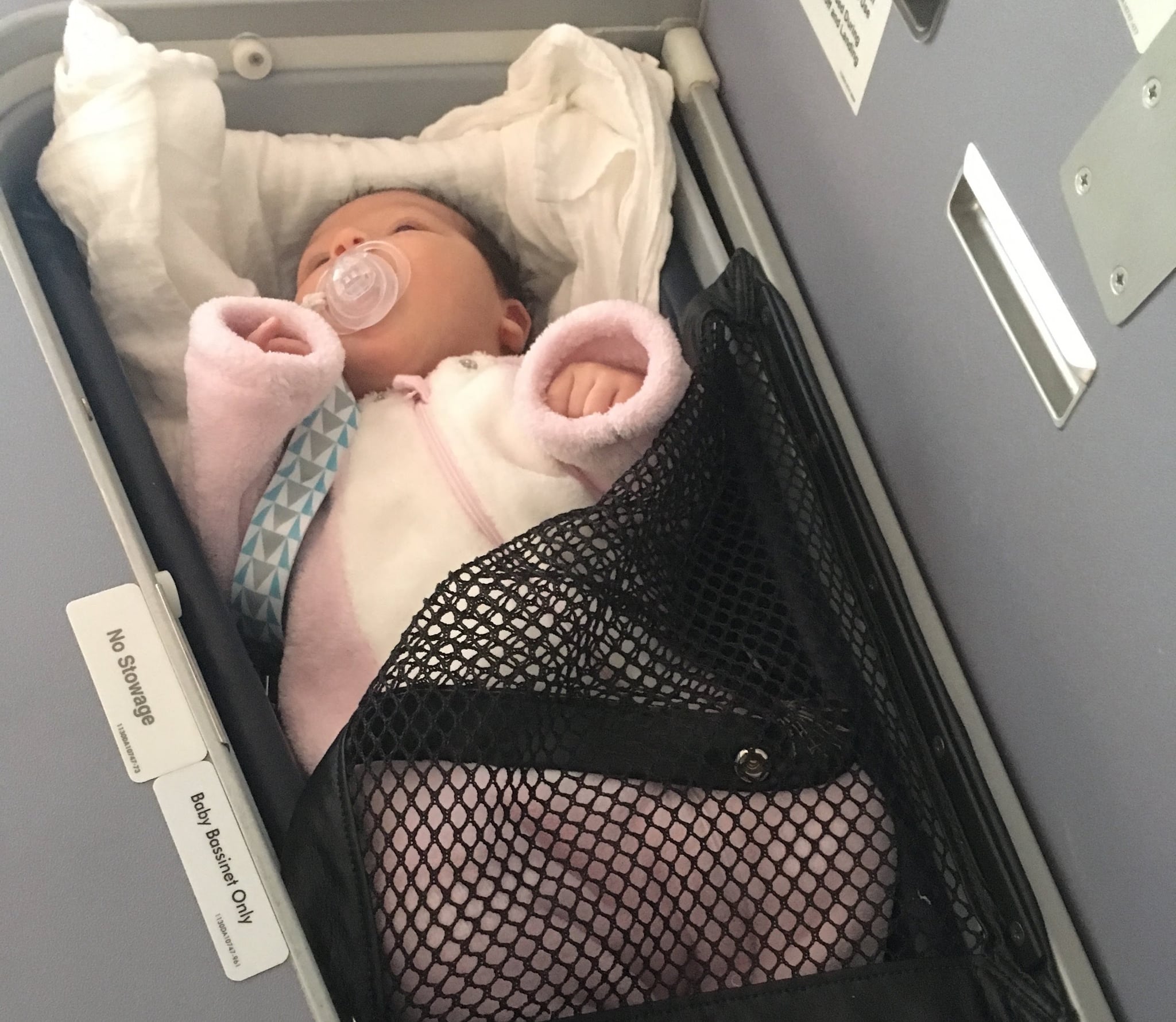
Flying with an infant. Not a new parent's idea of fun, right? The good news: it's probably the easiest time to fly with your child, since their main activities involve eating and sleeping. I took the first flight with my daughter when she was 4 weeks old — from Paris to San Francisco — and I'll admit I was a nervous wreck before. In fact, I think I was more worried about the long flight than I was about the labor! To help out other travelling parents, I reached out to longtime flight attendants to create a definitive list of tips for flying with an infant:
Before You Leave
Call ahead: "I highly encourage calling the airline to ask any questions you may have ahead of time," said Kelli Rader, a flight attendant for JetBlue who takes a few trips a year with her children. "travelling families are not a foreign concept, so airline personnel are equipped to answer any questions that you can have." Make a list of every question you can think of, and ask away. It will help you visualize the flight and remove uncertainty.
Reserve the bulkhead or a bassinet: "On Virgin Atlantic's aircrafts, we have infant cradles, which are great as the baby can actually lay down flat," Danielle Gatt-Spooner told me. She's worked as a flight attendant for the airline for 16 years and has two kids of her own. "There is also the option to prebook seats in the bulkheads, which are always great as you get extra legroom." When you call the airline, be sure to ask about the baby-friendly seat options.
At 1-month old, my baby fit in the plane's built-in bassinet on a United flight. Call your airline to ask about options.
Don't overpack: It's tempting to bring all your baby gear on a trip, especially if it's your first time travelling with your little one. But Rader said overpacking is a mistake she's made herself: "It was way more stressful when I had to juggle more things through security, the airport, my destination, and back." I've been there, too. On our first holiday as a family, I packed a travel crib. But when we arrived at the hotel, there was already a crib in our room. If you're staying at a hotel, call ahead to see what might be available on site.
Bring extra items to soothe your baby: While you don't want to overpack, those small things that comfort your infant don't take up much room. Jenna Leigh, a single mom, author [1], and flight attendant for a major US carrier, suggested packing special stuffed animals or blankets. And you can never have too many pacifiers, since they're bound to end up on the dirty floor at some point.
Pack medication in your carry-on: Gatt-Spooner said medication is a must have. And make sure it makes it onto the plane with you and not in your checked luggage. Before I flew with my 1-month-old, I talked to her pediatrician about what medication I should have onboard in case something went wrong. She told me to bring infant Tylenol and a thermometer and walked me through what to do should she get a fever during the long flight. Talk to your pediatrician before a flight, and take notes, so you're not panicking if the time comes.
Bring more than one change of clothes: Gatt-Spooner pointed out that you may need not one, not two, but maybe three sets of clean clothes for your baby during the flight. I find it easiest to pack warm footy pajamas as backups, since you don't have to keep track of pants, onesies, sweaters, and socks.
Use a backpack: "I recommend utilizing a backpack as a diaper bag instead of a purse-style one," Rader said. "It keeps things out of the way if you drop something. It's just overall easier on your body and keeps your hands free." And remember, diaper bags and breast pumps typically don't count toward your allotted carry-on baggage.
Make items easy to grab: Rader also has this tip: "pack the diaper bag so things can be easily grabbed out of it and you don't have to drag the whole bag down the aisle to the lavatory." I do this by using packing cubes available on Amazon [2]. I store diapers and wipes in one cube, so I can simply grab the smaller bag within the bag when needed.
At the Airport
Plan for extra time at TSA: "You're allowed to take formula as well as breast milk through TSA. There will just be extra screening involved," explained Rader. Note that you will also have to take your baby out of their stroller to walk through security, even if they're fast asleep. Reduce stress by getting to the airport earlier.
Talk to the agent at the gate: Rader said airline workers want to assist you before you board: "I try to help the boarding process for them. Juggling bags and kids isn't an easy task, so I make sure their plane side items are tagged." In addition to tagging your stroller or car seat for gate check, agents can also make sure you have an empty seat in your row.
Pack snacks for yourself: "I make sure to bring extra snacks for myself," Rader said. "Hungry mommas are not good." Just like with the oxygen mask in the plane, you have to make sure your needs are met before you can help your baby.
On the Flight
Sanitize your seat: According to Leigh, sickness can spread quickly on a flight. "We once had a sick child throw up. It was like a chain reaction. The person next to them also got sick, then the passenger behind them. By the end of the flight we had four people that had thrown up." Yikes! To avoid the spread of viruses, bring disinfectant wipes on the plane, and wipe down or avoid the spots with the most germs [3]: the toilet flush button, tray table, seat-belt buckle, and overhead air vent. Wash your hands extra well or use a hand sanitizer if you do have to touch them.
Have your baby suck during takeoff and landing: "Infants' ears tend to plug up during takeoff and landing," Leigh noted. "To help prevent this, have the baby suck on a bottle or pacifier," she recommended. I've also had luck nursing during this time.
Accept crying: "A common mistake parents make is to worry and get themselves stressed when a baby is crying," Gatt-Spooner told me. "As hard as it is, the calmer they can stay, the more it will help their little ones." Take a deep breath and remember no one feels as bad as you do about your crying baby!
Ask for diaper-changing assistance: No, don't expect the flight attendants to change your baby's diaper. But Gatt-Spooner said the cabin crew can make the whole ordeal easier by giving you bags to put your rubbish in or pointing you toward the baby-changing station on board.
Hold your meals: Gatt-Spooner suggested talking to flight attendants ahead of time about the schedule of the flight, especially if it's a long one. They can let you know when the lights will go on and off and when the meals will be served. If it's not a good time for you to eat, they can keep your dinner warm for you.
Heat up milk on board: Flight attendants can also heat up milk or food for your baby, according to Gatt-Spooner.
Ask for a blanket: "That little bit of comfort goes a long way," Rader explained. If you didn't pack a blanket, ask the flight attendant for one. And if you did pack one, having more than one can keep you and your little one extra cosy.
Request extra water: "During the flight, I make sure mom has enough water available. If she's nursing, she needs to be hydrated, and if she's using formula, she may need water to mix," Rader said. Flight attendants will understand if you ask for beverage service outside of the regular times — and they may even spot you a whole water bottle to make everyone's life easier.
Call on the flight attendant if you need a break: If you're flying solo with an infant, you can ask for a second set of hands. "I do my best to make myself available if they need to take a bathroom break," Rader said. If you're lucky, you might also get a free cocktail and a few words of encouragement.
